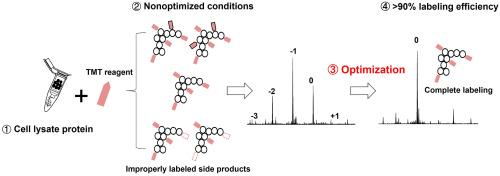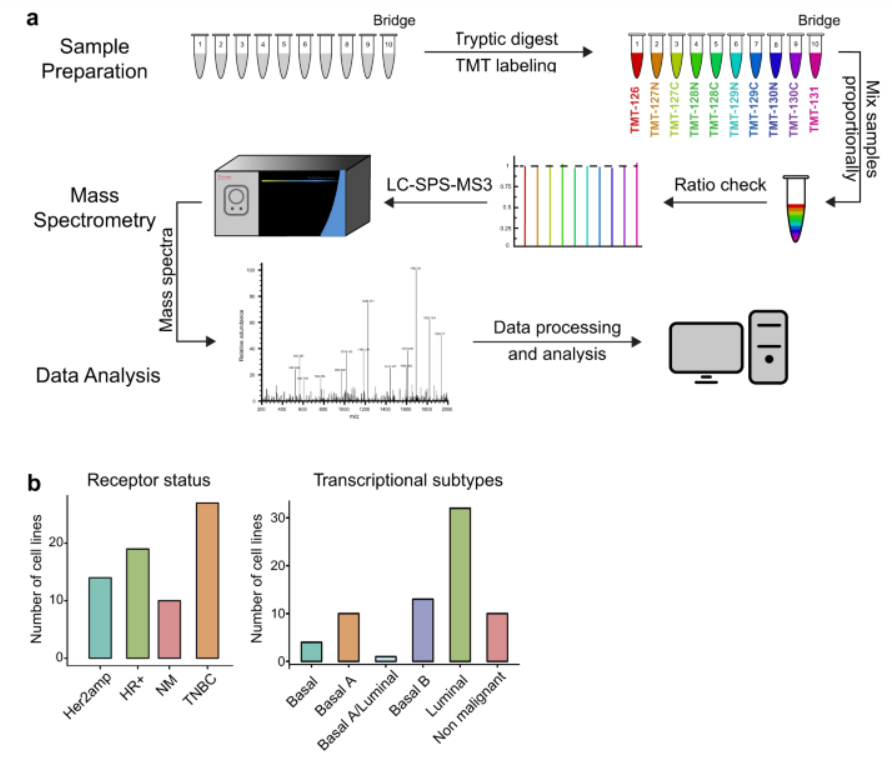TMT Labeling Mass Spec Service
Tandem Mass Tag Mass Spectrometry (TMT-MS) is an advanced proteomics analysis technology that combines tandem mass tag (TMT) labeling and mass spectrometry (MS) analysis. The TMT labeling mass spec service offers high-throughput quantitative capabilities, high sensitivity, and accuracy, providing in-depth proteomic information:
1. High-Throughput Quantitative Capabilities
(1) Simultaneous Multi-Sample Analysis: TMT labeling mass spec service enables simultaneous processing of multiple samples, typically labeling and analyzing up to 16 samples in a single experiment. This capability is particularly advantageous for comparing proteomic changes under different conditions (e.g., disease vs. healthy states, treated vs. untreated). For example, when studying tumorigenesis, this method allows concurrent analysis of tumor tissues, adjacent non-cancerous tissues, and normal tissues, significantly improving experimental efficiency.
(2) Large-Scale Protein Quantification: TMT labeling mass spec service can quantify thousands of proteins within a sample. This high-throughput feature facilitates large-scale screening and comparative analysis at the proteome level, aiding in the discovery of novel biomarkers or drug targets.
2. High Sensitivity and Accuracy
(1) Detection of Low-Abundance Proteins: TMT labeling mass spec service exhibits high sensitivity, enabling the detection of low-abundance proteins. In complex biological samples, many proteins with critical biological functions, such as transcription factors or kinases involved in signaling pathways, may be expressed at low levels and are difficult to detect using traditional methods. TMT-MS effectively captures signals from these low-abundance proteins.
(2) Precise Quantification: With carefully designed TMT tags and precise MS analysis, TMT-MS provides highly accurate relative quantification of protein abundances. This accuracy allows detection of subtle changes in protein expression levels, which can be crucial for early disease diagnosis or drug efficacy evaluation.
3. In-Depth Proteomic Information
(1) Comprehensive Proteome Coverage: TMT labeling mass spec service offers comprehensive analysis of the proteome, identifying numerous proteins and providing information on post-translational modifications (e.g., phosphorylation, glycosylation). Understanding protein modifications is vital for studying changes in protein activity and function in cellular physiology or disease mechanisms.
(2) Dynamic Monitoring of Protein Changes: TMT-MS enables dynamic monitoring of proteomic changes under different time points or treatment conditions. For example, protein expression and modification states may vary during different phases of the cell cycle, and TMT-MS can capture these dynamic changes to provide deeper insights into cellular physiological processes.
The development of TMT-MS was not an overnight breakthrough but rather the culmination of decades of advancements in mass spectrometry technology. Early MS applications focused on identifying single compounds or simple mixtures, but the growing demand for comprehensive proteomic analysis of complex biological samples drove innovations in the field. From initial protein digestion and MS coupling to the introduction of chemical labeling strategies for differentiating peptides from various samples, the groundwork for TMT-MS was laid. Over years of refinement, today's TMT labeling mass spec service offers unparalleled capabilities, including simultaneous multi-sample processing and high-precision quantification of thousands of proteins, making it an indispensable tool in proteomics research.
Services at MtoZ Biolabs
MtoZ Biolabs employs Thermo Fisher's Q Exactive HF mass spectrometry platform and Orbitrap Fusion Lumos platform combined with Nano-LC to deliver quantitative proteomics analysis services based on TMT/iTRAQ/MultiNotch MS. You only need to tell us the purpose of your experiment and send us your protein sample, and we will be responsible for all subsequent matters of the project, including protein digestion, peptide labeling, peptide separation, mass spectrometry analysis, mass spectrometry raw data analysis, and Bioinformatics analysis.

Guo,Y T. et al. Analytica Chimica Acta. 2022.
Figure 1. General Process of TMT.
Technical Principles
The process of TMT labeling mass spec service can be divided into several steps: First, proteins extracted from different samples are digested into peptides. These peptides are then labeled using TMT reagents. After labeling, the peptides are mixed and analyzed by a mass spectrometer. The mass spectrometer ionizes the peptides, separates them based on their mass-to-charge ratio (m/z), and measures their mass and relative abundance. TMT reagents are compounds with specific chemical structures comprising an active group that reacts with peptides, a balance group, and a reporter ion group. Different TMT reagents have distinct mass tags, allowing identification of which sample a peptide originated from during subsequent mixed sample analysis.
During tandem mass spectrometry analysis, selected ions undergo further fragmentation, generating fragment ions. These fragment ions provide information that can be used to deduce the amino acid sequence of the peptides. By combining the mass differences of TMT tags with peptide fragment information, quantitative and qualitative analysis of the same protein across different samples can be achieved.
Service Advantages
1. Advanced Analytical Platform
MtoZ Biolabs has established advanced TMT labeling mass spec service platform, ensuring reliable, rapid, and high-precision analytical services.
2. Transparent Pricing
Our pricing is transparent, with no hidden or additional fees.
3. High Data Quality
With deep data coverage and strict quality control, our AI-driven bioinformatics platform integrates all spatial proteomics data, delivering comprehensive data reports to clients.
4. Customized Research Solutions
MtoZ Biolabs provides tailored services to address your unique research questions and experimental requirements.
Applications
1. Biomedical Research
(1) Disease Studies: Compare tumor versus normal tissues or samples from patients with neurodegenerative diseases versus healthy individuals. This helps in biomarker discovery, elucidating disease mechanisms, and supporting early diagnosis and treatment monitoring.
(2) Drug Development: Identify potential drug targets, analyze drug mechanisms of action, evaluate efficacy based on patient proteomic profiles, and drive personalized medicine.
2. Basic Biological Research
(1) Cellular Studies: Investigate protein changes in metabolism, cell cycle, and signal transduction to clarify cellular physiological processes.
(2) Gene Function Exploration: Compare proteomes of wild-type and mutant samples to understand gene function.
3. Agricultural and Food Sciences
(1)Agricultural Research: Analyze proteins related to crop stress resistance and quality traits to assist in breeding superior varieties.
(2) Food Testing: Perform highly sensitive detection of allergens and toxin proteins to ensure food quality and safety.
Case Study

Kalocsay, M. et al. Scientific Data, 2023.
Figure 2. Schematic Diagram of Mass Spectrometry Workflow.
Using TMT-MS technology, researchers conducted an in-depth and comprehensive analysis of breast cancer tissues, successfully uncovering a series of potential biomarkers and therapeutic targets. These findings not only enhance our understanding of the mechanisms underlying breast cancer but also provide a solid theoretical foundation and valuable practical guidance for clinical diagnosis, treatment optimization, and new drug development. Looking ahead, with continuous technological advancements and increased sample sizes, it is expected that breast cancer molecular subtyping will become more refined, leading to the development of more precise and personalized diagnostic and therapeutic approaches. Furthermore, combining TMT-MS with other cutting-edge technologies (such as single-cell sequencing, spatial transcriptomics, etc.), it will be possible to reveal the heterogeneity of breast cancer from multiple dimensions and unearth more key features hidden in tumor cells. Information has pushed the level of breast cancer diagnosis and treatment to new heights, bringing greater hope to the health and well-being of women around the world.
MtoZ Biolabs, an integrated Chromatography and Mass Spectrometry (MS) Services Provider, provides advanced proteomics, metabolomics, and biopharmaceutical analysis services to researchers in biochemistry, biotechnology, and biopharmaceutical fields. Our ultimate aim is to provide more rapid, high-throughput, and cost-effective analysis, with exceptional data quality and minimal sample consumption. Free project evaluation, welcome to learn more details!
How to order?







